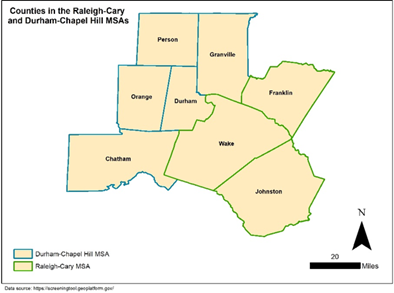
There has been quite a bit of interest lately in the Climate Pollution Reduction Grant (CPRG), informally known as CPRG. We wanted to answer a few of your burning questions and highlight work that is completed, underway, or upcoming.
What exactly is CPRG? Who is funding it and how is Central Pines Regional Council (CPRC) involved?
CPRG is a two-stage program funded by the US Environmental Protection Agency (EPA) to develop and implement impactful plans to reduce greenhouse gas emissions across the country. This includes funding for noncompetitive planning grants and competitive implementation grants.
Stage 1: $1M planning grants awarded to the 67 largest regions in the country. Central Pines Regional Council received funding to develop our region’s plans by 2026.
Stage 2: Competitive process for $4.6B in implementation funds; Applications due April 01, 2024 (See questions 4-6 for more detail about these funds)
As the lead agency for our region’s CPRG planning grant, Central Pines Regional Council (CPRC) is responsible for producing three key deliverables:
- Priority Climate Action Plan (PCAP): Submitted on Feb 29, 2024
- Comprehensive Climate Action Plan (CCAP): Due summer/fall of 2025
- Status Report- Fall 2027
What jurisdictions are covered under the Central Pines CPRG grant?
Eight counties are covered by the Central Pines CPRG grant, representing the Raleigh-Cary Metropolitan Statistical Area (MSA) and the Durham-Chapel Hill (MSA).

What has been accomplished so far under our region's CPRG planning grant?
- Held 4 Community Climate Conversations across the region, and two Community-Based Organization (CBO) workshops. These conversations were used to inform the Priority Climate Action Plan (PCAP).
- Submitted our region’s PCAP on Feb 29. The plan includes a concrete list of tactics to reduce climate pollution across the region and was developed in coordination with local governments, regional partners, and the state of NC.
- Partnered on state’s implementation grant to include $15.4 million in funding to implement projects from the plan.
How can other jurisdictions (municipalities/counties) get involved?
Jurisdictions can get involved in two ways:
Planning Stage
-Participate in the monthly Steering Committee and help inform the development of the region’s Comprehensive Climate Action Plan (CCAP).
-Help with community engagement to get feedback from your residents on what greenhouse gas (GHG) reduction tactics are most important for them and they are willing to participate in. The second deliverable (CCAP) is due in fall 2025 and we would very much appreciate more input from a wider range of residents.
-Utilize and Promote Online Toolkit: The CBO Toolkit equips local organizations to lead conversations about climate goals, identify priority climate actions for their organizations and communities, and build support for action. CBO’s that are interested in funding for climate education and engagement around regional climate planning can reach out to Shuchi Gupta at sgupta@centralpinesnc.gov
- Implementation Stage: The State of North Carolina is leading an effort to apply for $200M in funding through the implementation grant. *If they are awarded*, there will be opportunities for local governments to apply for funding through the State for actions that reduce climate-warming air emissions in Transportation, Buildings, Electricity, Industry, and Waste.
Will there be more CPRG funding for local jurisdictions (municipalities and counties) in the future? If so, when?
Yes, BUT only if the State is awarded. CPRC, Centralina Regional Council, the State of North Carolina, and the Department of Environmental Quality (DEQ) worked together to submit a single strong application of $200M. This application has provision for local jurisdictions (municipalities and counties) to apply for competitive funding.
If awarded, those details will be released by the State in late 2024/2025.
If you would like to start getting ready—know that funding that benefits low-income disadvantaged communities (LIDAC) will be prioritized per EPA’s requirements. LIDAC communities are grouped by census tract, which can be seen on this online map.
Have a question about the grant or process that isn't answered above? Reach out to Emily Barrett, ebarrett@centralpinesnc.gov.